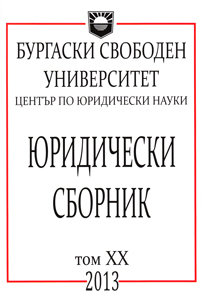ИЗПОЛЗВАНЕ НА СПЕЦИАЛНИ ЗНАНИЯ В НАКАЗАТЕЛНОТО И ГРАЖДАНСКОТО ПРОИЗВОДСТВО - СЪСТОЯНИЕ И ПРОБЛЕМИ
USING SPECIAL KNOWLEDGE IN CRIMINAL AND CIVIL PROCEEDINGS - SITUATION AND PROBLEMS
Author(s): Kostadin BobevSubject(s): Law, Constitution, Jurisprudence
Published by: Бургаски свободен университет
Summary/Abstract: Specific knowledge, used subjectively in the process of practical activities, is based on professional training, experience and theoretical knowledge system in the existing area. Specific knowledge can be used in procedural and non-procedural form. Entities, using the procedural form of specialized knowledge are: prosecutors, investigative bodies, experts, having knowledge in science, technology, arts and crafts. Important procedural form, using specific knowledge in the litigation process is the forensic expertise. It is a procedural action, concluding in carrying out studies on different objects, requested by investigative bodies or court. Special knowledge may vary according to their type: forensic expertise, economic expertise, technical expertise, etc. The expert’s conclusion as a source of evidence is subject to assessment, which reflects the possibility a discrepancy between the objective judgments of the expert and his actions to be found. There are two types of reasons, leading to erroneous conclusions: objective, i.e. reasons beyond the expert as subject of the expert, and subjective – originating from the way of thinking and the actions of the expert. Essential to the litigation process is the discovery of these errors, which led to the incorrect conclusion of the expert and remained undetected.
Journal: Юридически сборник
- Issue Year: XVIII/2011
- Issue No: 1
- Page Range: 22-31
- Page Count: 9
- Language: Bulgarian

